LIBS 1910 - Analysis of Fracking Impacts in Canada: Conestoga College
VerifiedAdded on 2023/05/30
|5
|1115
|419
Report
AI Summary
This report examines the backdrop of fracking in Canada, detailing its history and increased activities in the new millennium. It addresses the social, economic, political, and ecological issues surrounding fracking, including environmental concerns such as water contamination, radioactive waste management, atmospheric emissions, and induced seismicity. The report also discusses the political impacts, noting the curtailing of environmental norms to boost fracking and gas production. Economically, fracking has led to significant financial gains and employment opportunities. The report concludes that while fracking is a major activity in Canada, it requires stringent regulation and monitoring to prevent environmental damage and promote sustainable methods, emphasizing the need for legislative measures and stakeholder accountability.
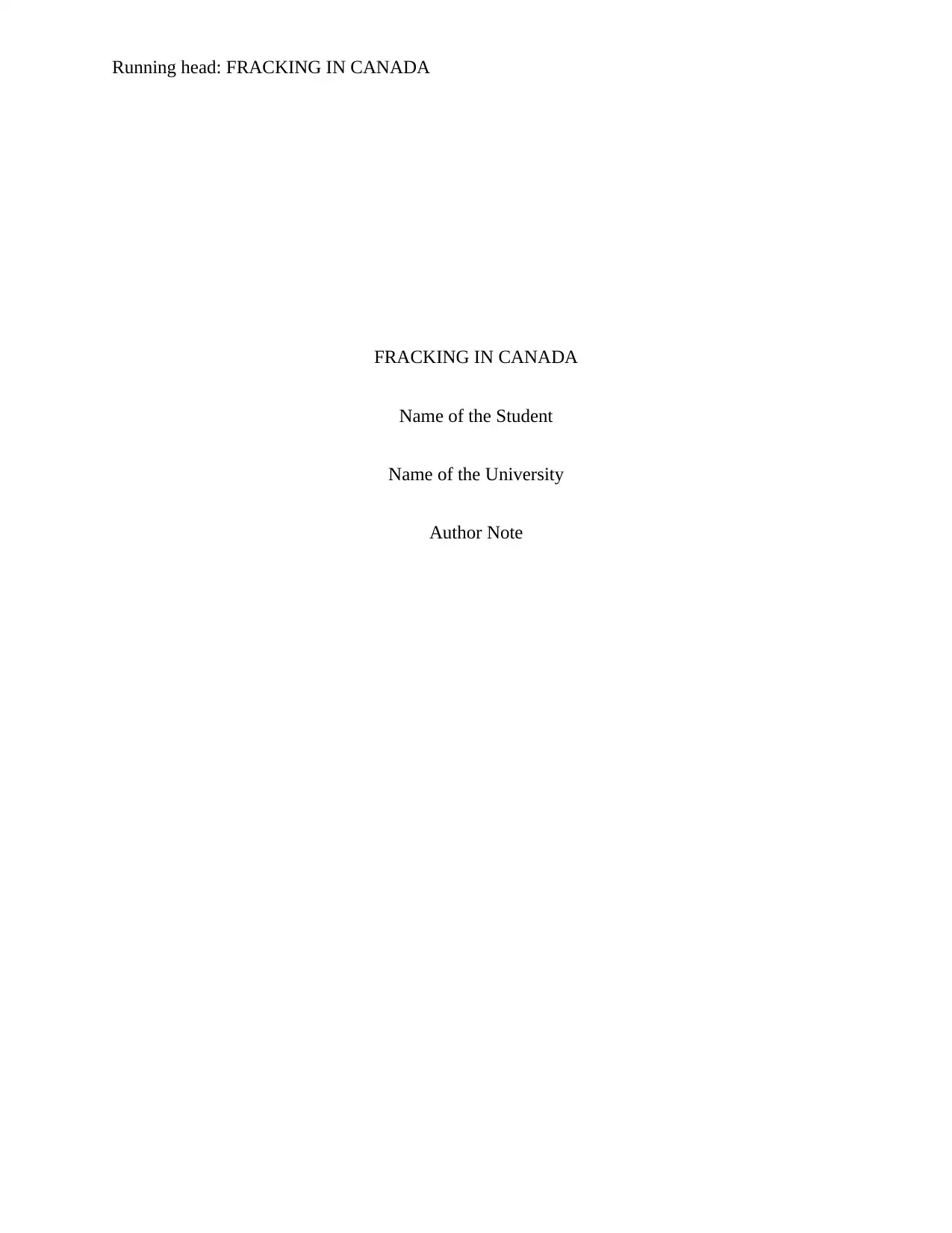
Running head: FRACKING IN CANADA
FRACKING IN CANADA
Name of the Student
Name of the University
Author Note
FRACKING IN CANADA
Name of the Student
Name of the University
Author Note
Paraphrase This Document
Need a fresh take? Get an instant paraphrase of this document with our AI Paraphraser
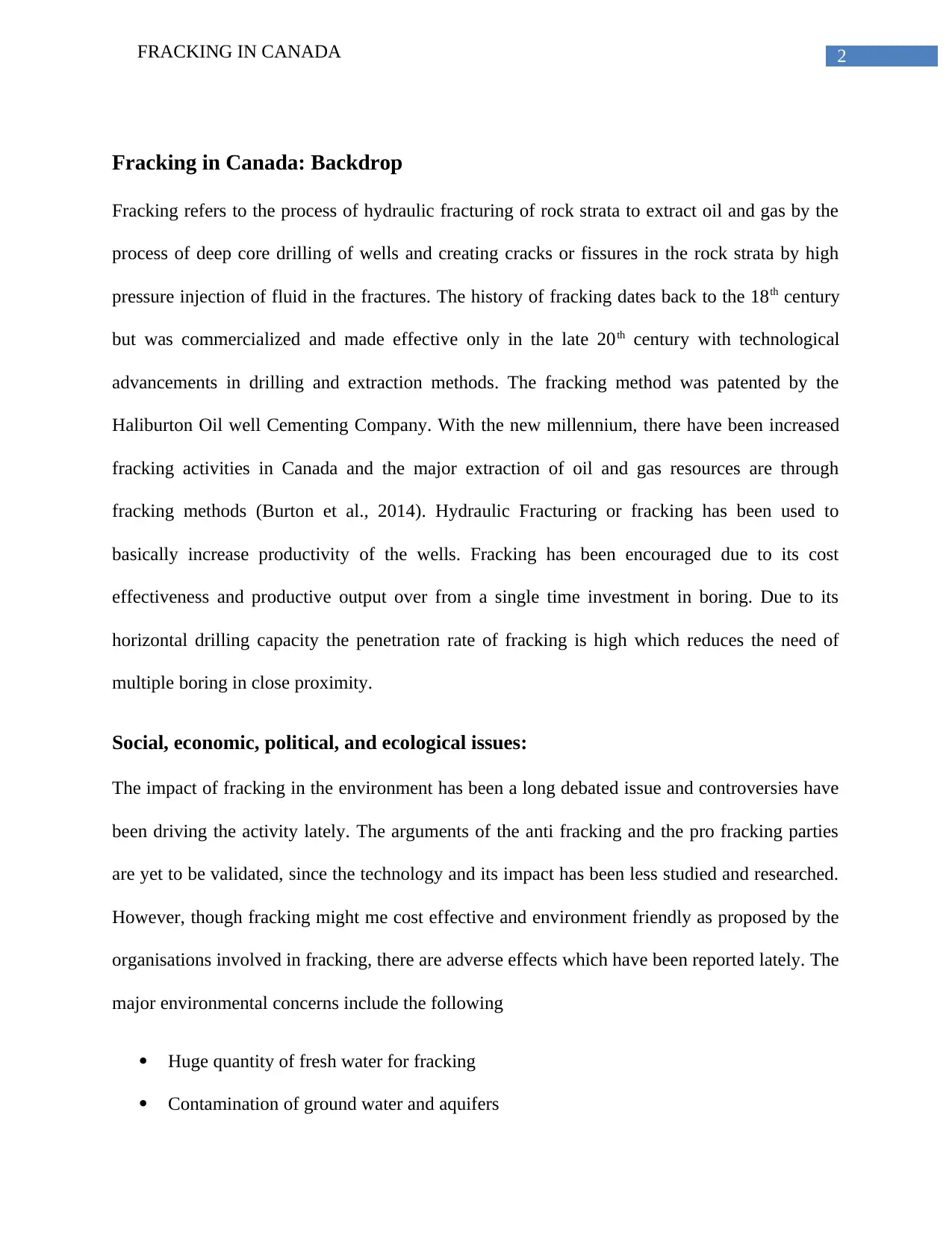
2FRACKING IN CANADA
Fracking in Canada: Backdrop
Fracking refers to the process of hydraulic fracturing of rock strata to extract oil and gas by the
process of deep core drilling of wells and creating cracks or fissures in the rock strata by high
pressure injection of fluid in the fractures. The history of fracking dates back to the 18th century
but was commercialized and made effective only in the late 20th century with technological
advancements in drilling and extraction methods. The fracking method was patented by the
Haliburton Oil well Cementing Company. With the new millennium, there have been increased
fracking activities in Canada and the major extraction of oil and gas resources are through
fracking methods (Burton et al., 2014). Hydraulic Fracturing or fracking has been used to
basically increase productivity of the wells. Fracking has been encouraged due to its cost
effectiveness and productive output over from a single time investment in boring. Due to its
horizontal drilling capacity the penetration rate of fracking is high which reduces the need of
multiple boring in close proximity.
Social, economic, political, and ecological issues:
The impact of fracking in the environment has been a long debated issue and controversies have
been driving the activity lately. The arguments of the anti fracking and the pro fracking parties
are yet to be validated, since the technology and its impact has been less studied and researched.
However, though fracking might me cost effective and environment friendly as proposed by the
organisations involved in fracking, there are adverse effects which have been reported lately. The
major environmental concerns include the following
Huge quantity of fresh water for fracking
Contamination of ground water and aquifers
Fracking in Canada: Backdrop
Fracking refers to the process of hydraulic fracturing of rock strata to extract oil and gas by the
process of deep core drilling of wells and creating cracks or fissures in the rock strata by high
pressure injection of fluid in the fractures. The history of fracking dates back to the 18th century
but was commercialized and made effective only in the late 20th century with technological
advancements in drilling and extraction methods. The fracking method was patented by the
Haliburton Oil well Cementing Company. With the new millennium, there have been increased
fracking activities in Canada and the major extraction of oil and gas resources are through
fracking methods (Burton et al., 2014). Hydraulic Fracturing or fracking has been used to
basically increase productivity of the wells. Fracking has been encouraged due to its cost
effectiveness and productive output over from a single time investment in boring. Due to its
horizontal drilling capacity the penetration rate of fracking is high which reduces the need of
multiple boring in close proximity.
Social, economic, political, and ecological issues:
The impact of fracking in the environment has been a long debated issue and controversies have
been driving the activity lately. The arguments of the anti fracking and the pro fracking parties
are yet to be validated, since the technology and its impact has been less studied and researched.
However, though fracking might me cost effective and environment friendly as proposed by the
organisations involved in fracking, there are adverse effects which have been reported lately. The
major environmental concerns include the following
Huge quantity of fresh water for fracking
Contamination of ground water and aquifers
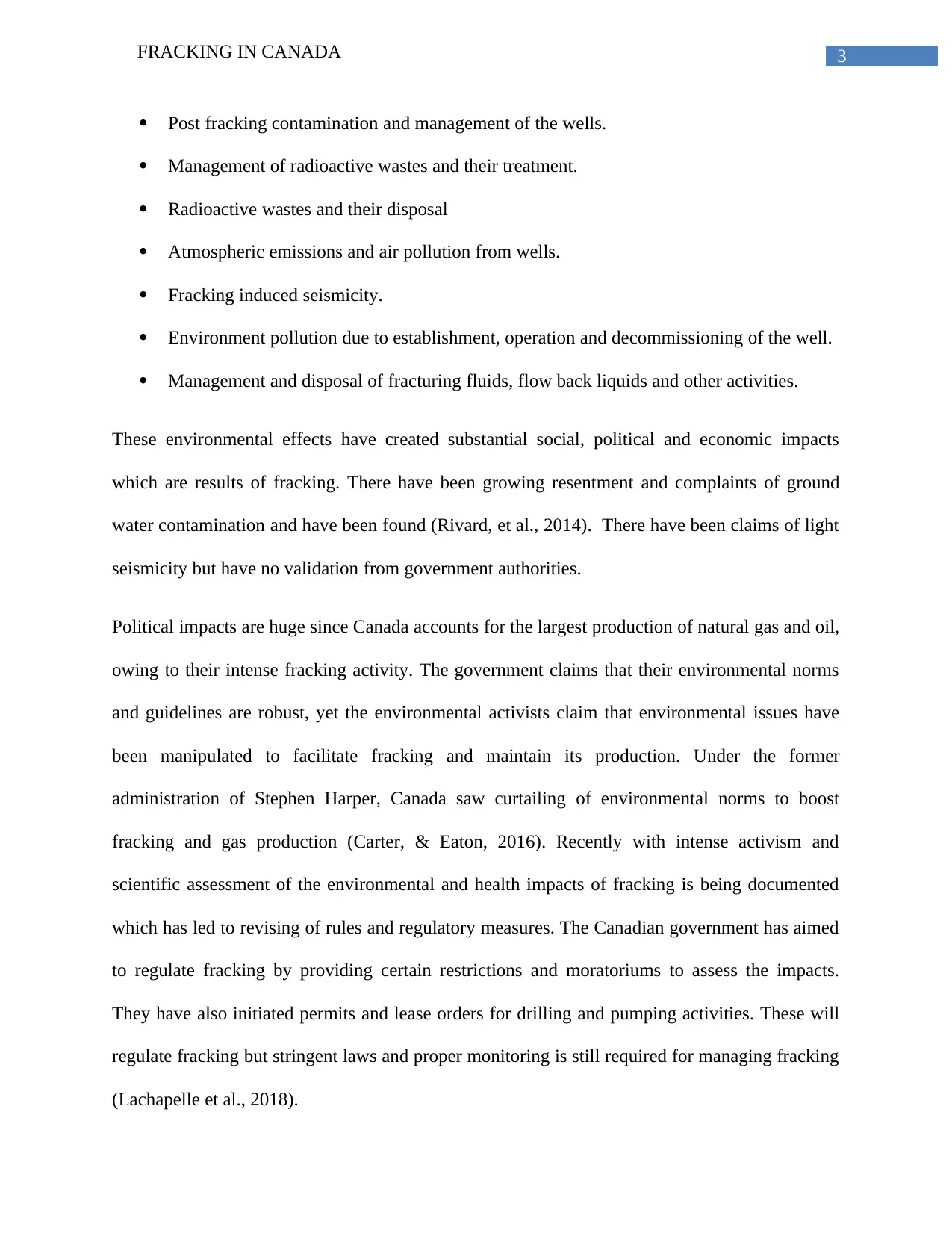
3FRACKING IN CANADA
Post fracking contamination and management of the wells.
Management of radioactive wastes and their treatment.
Radioactive wastes and their disposal
Atmospheric emissions and air pollution from wells.
Fracking induced seismicity.
Environment pollution due to establishment, operation and decommissioning of the well.
Management and disposal of fracturing fluids, flow back liquids and other activities.
These environmental effects have created substantial social, political and economic impacts
which are results of fracking. There have been growing resentment and complaints of ground
water contamination and have been found (Rivard, et al., 2014). There have been claims of light
seismicity but have no validation from government authorities.
Political impacts are huge since Canada accounts for the largest production of natural gas and oil,
owing to their intense fracking activity. The government claims that their environmental norms
and guidelines are robust, yet the environmental activists claim that environmental issues have
been manipulated to facilitate fracking and maintain its production. Under the former
administration of Stephen Harper, Canada saw curtailing of environmental norms to boost
fracking and gas production (Carter, & Eaton, 2016). Recently with intense activism and
scientific assessment of the environmental and health impacts of fracking is being documented
which has led to revising of rules and regulatory measures. The Canadian government has aimed
to regulate fracking by providing certain restrictions and moratoriums to assess the impacts.
They have also initiated permits and lease orders for drilling and pumping activities. These will
regulate fracking but stringent laws and proper monitoring is still required for managing fracking
(Lachapelle et al., 2018).
Post fracking contamination and management of the wells.
Management of radioactive wastes and their treatment.
Radioactive wastes and their disposal
Atmospheric emissions and air pollution from wells.
Fracking induced seismicity.
Environment pollution due to establishment, operation and decommissioning of the well.
Management and disposal of fracturing fluids, flow back liquids and other activities.
These environmental effects have created substantial social, political and economic impacts
which are results of fracking. There have been growing resentment and complaints of ground
water contamination and have been found (Rivard, et al., 2014). There have been claims of light
seismicity but have no validation from government authorities.
Political impacts are huge since Canada accounts for the largest production of natural gas and oil,
owing to their intense fracking activity. The government claims that their environmental norms
and guidelines are robust, yet the environmental activists claim that environmental issues have
been manipulated to facilitate fracking and maintain its production. Under the former
administration of Stephen Harper, Canada saw curtailing of environmental norms to boost
fracking and gas production (Carter, & Eaton, 2016). Recently with intense activism and
scientific assessment of the environmental and health impacts of fracking is being documented
which has led to revising of rules and regulatory measures. The Canadian government has aimed
to regulate fracking by providing certain restrictions and moratoriums to assess the impacts.
They have also initiated permits and lease orders for drilling and pumping activities. These will
regulate fracking but stringent laws and proper monitoring is still required for managing fracking
(Lachapelle et al., 2018).
⊘ This is a preview!⊘
Do you want full access?
Subscribe today to unlock all pages.

Trusted by 1+ million students worldwide
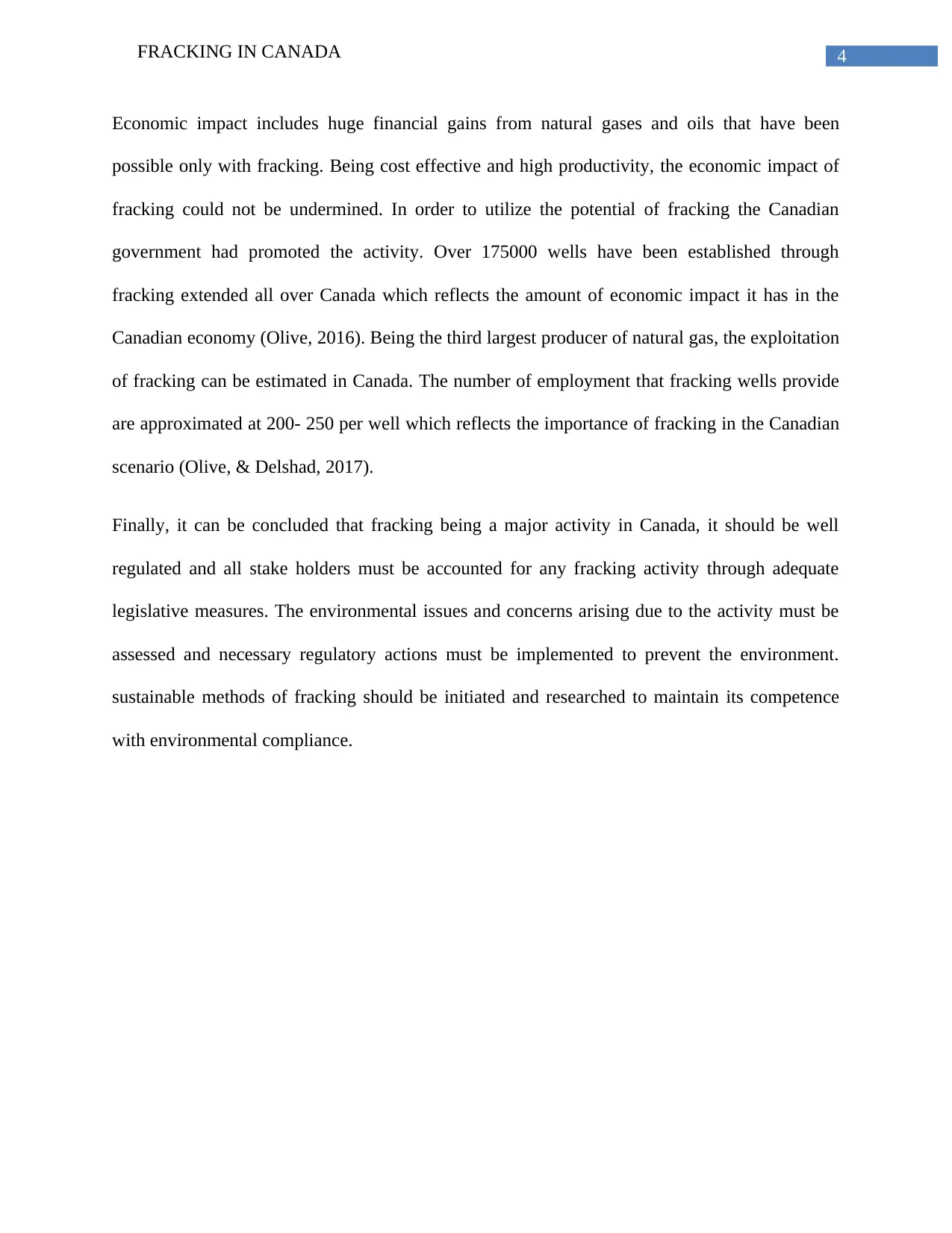
4FRACKING IN CANADA
Economic impact includes huge financial gains from natural gases and oils that have been
possible only with fracking. Being cost effective and high productivity, the economic impact of
fracking could not be undermined. In order to utilize the potential of fracking the Canadian
government had promoted the activity. Over 175000 wells have been established through
fracking extended all over Canada which reflects the amount of economic impact it has in the
Canadian economy (Olive, 2016). Being the third largest producer of natural gas, the exploitation
of fracking can be estimated in Canada. The number of employment that fracking wells provide
are approximated at 200- 250 per well which reflects the importance of fracking in the Canadian
scenario (Olive, & Delshad, 2017).
Finally, it can be concluded that fracking being a major activity in Canada, it should be well
regulated and all stake holders must be accounted for any fracking activity through adequate
legislative measures. The environmental issues and concerns arising due to the activity must be
assessed and necessary regulatory actions must be implemented to prevent the environment.
sustainable methods of fracking should be initiated and researched to maintain its competence
with environmental compliance.
Economic impact includes huge financial gains from natural gases and oils that have been
possible only with fracking. Being cost effective and high productivity, the economic impact of
fracking could not be undermined. In order to utilize the potential of fracking the Canadian
government had promoted the activity. Over 175000 wells have been established through
fracking extended all over Canada which reflects the amount of economic impact it has in the
Canadian economy (Olive, 2016). Being the third largest producer of natural gas, the exploitation
of fracking can be estimated in Canada. The number of employment that fracking wells provide
are approximated at 200- 250 per well which reflects the importance of fracking in the Canadian
scenario (Olive, & Delshad, 2017).
Finally, it can be concluded that fracking being a major activity in Canada, it should be well
regulated and all stake holders must be accounted for any fracking activity through adequate
legislative measures. The environmental issues and concerns arising due to the activity must be
assessed and necessary regulatory actions must be implemented to prevent the environment.
sustainable methods of fracking should be initiated and researched to maintain its competence
with environmental compliance.
Paraphrase This Document
Need a fresh take? Get an instant paraphrase of this document with our AI Paraphraser
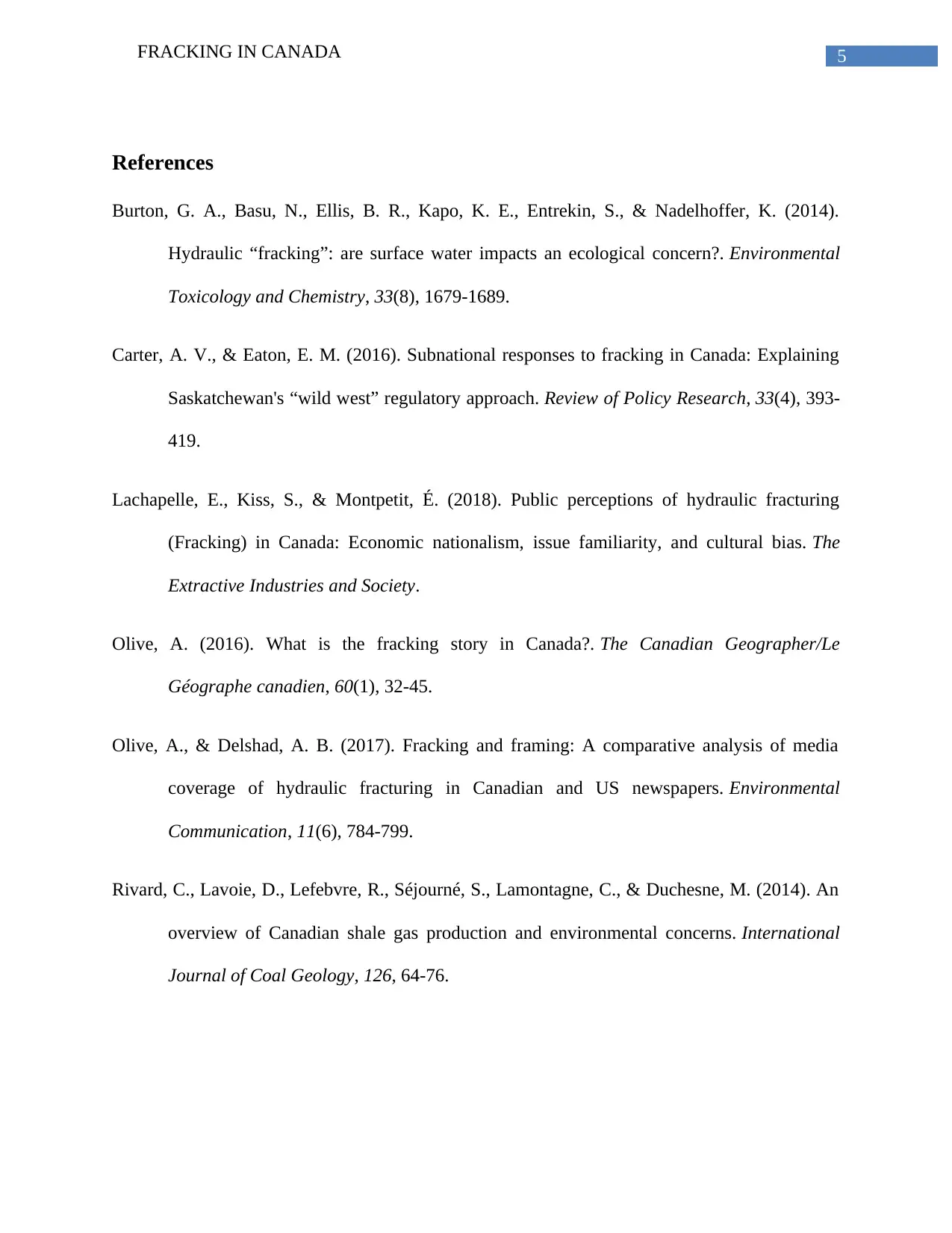
5FRACKING IN CANADA
References
Burton, G. A., Basu, N., Ellis, B. R., Kapo, K. E., Entrekin, S., & Nadelhoffer, K. (2014).
Hydraulic “fracking”: are surface water impacts an ecological concern?. Environmental
Toxicology and Chemistry, 33(8), 1679-1689.
Carter, A. V., & Eaton, E. M. (2016). Subnational responses to fracking in Canada: Explaining
Saskatchewan's “wild west” regulatory approach. Review of Policy Research, 33(4), 393-
419.
Lachapelle, E., Kiss, S., & Montpetit, É. (2018). Public perceptions of hydraulic fracturing
(Fracking) in Canada: Economic nationalism, issue familiarity, and cultural bias. The
Extractive Industries and Society.
Olive, A. (2016). What is the fracking story in Canada?. The Canadian Geographer/Le
Géographe canadien, 60(1), 32-45.
Olive, A., & Delshad, A. B. (2017). Fracking and framing: A comparative analysis of media
coverage of hydraulic fracturing in Canadian and US newspapers. Environmental
Communication, 11(6), 784-799.
Rivard, C., Lavoie, D., Lefebvre, R., Séjourné, S., Lamontagne, C., & Duchesne, M. (2014). An
overview of Canadian shale gas production and environmental concerns. International
Journal of Coal Geology, 126, 64-76.
References
Burton, G. A., Basu, N., Ellis, B. R., Kapo, K. E., Entrekin, S., & Nadelhoffer, K. (2014).
Hydraulic “fracking”: are surface water impacts an ecological concern?. Environmental
Toxicology and Chemistry, 33(8), 1679-1689.
Carter, A. V., & Eaton, E. M. (2016). Subnational responses to fracking in Canada: Explaining
Saskatchewan's “wild west” regulatory approach. Review of Policy Research, 33(4), 393-
419.
Lachapelle, E., Kiss, S., & Montpetit, É. (2018). Public perceptions of hydraulic fracturing
(Fracking) in Canada: Economic nationalism, issue familiarity, and cultural bias. The
Extractive Industries and Society.
Olive, A. (2016). What is the fracking story in Canada?. The Canadian Geographer/Le
Géographe canadien, 60(1), 32-45.
Olive, A., & Delshad, A. B. (2017). Fracking and framing: A comparative analysis of media
coverage of hydraulic fracturing in Canadian and US newspapers. Environmental
Communication, 11(6), 784-799.
Rivard, C., Lavoie, D., Lefebvre, R., Séjourné, S., Lamontagne, C., & Duchesne, M. (2014). An
overview of Canadian shale gas production and environmental concerns. International
Journal of Coal Geology, 126, 64-76.
1 out of 5
Related Documents
Your All-in-One AI-Powered Toolkit for Academic Success.
+13062052269
info@desklib.com
Available 24*7 on WhatsApp / Email
![[object Object]](/_next/static/media/star-bottom.7253800d.svg)
Unlock your academic potential
Copyright © 2020–2026 A2Z Services. All Rights Reserved. Developed and managed by ZUCOL.





